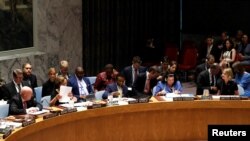ສະພາຄວາມໝັ້ນຄົງສະຫະປະຊາດ ໄດ້ລົງຄະແນນສຽງຢ່າງເປັນເອກກະສັນ ໃນວັນ
ອັງຄານວານນີ້ ເພື່ອຕໍ່ອາຍຸແລະເພີ້ມຄວາມເຂັ້ມແຂງ ໃຫ້ແກ່ການປະຕິບັດງານຂອງ
ຕົນຢູ່ໃນອັຟການີສຖານ ໂດຍເອົາຊະນະການຂົ່ມຂູ່ຂອງຈີນທີ່ຈະໃຊ້ສິດຢັບຢັ້ງ.
ສະພາມີກຳນົດລົງຄະແນນສຽ ງໃນວັນຈັນທີ່ຜ່ານມາ ນຶ່ງມື້ກ່ອນກຳນົດໃນການປະຕິ
ບັດງານທາງການເມືອງຈະໝົດອາຍຸລົງ. ແຕ່ຈີນໄດ້ຂົ່ມຂູ່ ທີ່ຈະໃຊ້ສິດຢັບຢັ້ງຕໍ່ຮ່າງຍັດ
ຕິດັ່ງກ່າວ ເພາະວ່າບໍ່ໄດ້ກ່າວເຖິງໂຄງການພັດທະນາ “ນຶ່ງແລວ ທາງ ນຶ່ງເສັ້ນທາງ” ທີ່
ເຊື່ອມຕໍ່ຈີນ ກັບບັນດາເຂດຕ່າງໆ ຂອງເອເຊຍ ຢູໂຣບ ແລະອາຟຣິກາ ໂດຍທາງທະເລ ແລະທາງພາກພື້ນດິນ.
ການປະນີປະນອມໃນວັນອັງຄານວານນີ້ ບໍ່ໄດ້ຮວມເອົາການກ່າວເຖິງແຜນການຂອງ
ຈີນໂດຍສະເພາະເຈາະຈົງແຕ່ໄດ້ກ່າວເຖິງການສະໜັບສະໜູນຕໍ່ການຮ່ວມ ມືຢູ່ໃນຂົງ
ເຂດ ແລະການຕິດຕໍ່ຫາກັນ ແລະເຮັດວຽກໄປສູ່ຄວາມອຸດົມຮັ່ງມີຂອງອັຟການິສຖານ.
ເອກອັກຄະລັດຖະທູດຈີນ ທ່ານຊັງ ຈູນ ກ່າວຫຼັງຈາກການລົງຄະແນນສຽງວ່າ “ໃນນາມ
ເພື່ອນບ້ານໂດຍກົງ ຈີນໂດຍທົ່ວໄປແລ້ວ ແມ່ນຕ້ອງການ ຢາກເຫັນສັນຕິພາບ ແລະສະ
ຖຽນລະພາບຢູ່ໃນອັຟການິສຖານ. ເພື່ອໃຫ້ມີສັນຕິພາບຢ່າງຖາວອນໃນອັຟການິສຖານ
ພວກເຮົາຄິດຢູ່ເລື້ອຍໆວ່າຕ້ອງມີແຮງກະຕຸ້ນຕໍ່ການພັດທະນາເສດຖະກິດ.”
ໃນຂະນະທີ່ມີຂໍ້ກຳນົດໃໝ່ຈຳນວນນຶ່ງ ຢູ່ໃນແຜນການປະຕິບັດງານຂອງສະຫະປະຊາ
ຊາດ ທີ່ສະທ້ອນໃຫ້ເຫັນເຖິງການພັດທະນາຕ່າງໆທີ່ພວມດຳເນີນຢູ່ນັ້ນ ເອກອັກຄະລັດ
ຖະທູດສະຫະລັດ ທ່ານນາງ ແຄລລີ ກຣາຟ ກ່າວວ່າ ມະຕິດັ່ງກ່າວຄວນເຂັ້ນແຂງຂຶ້ນ
ກວ່ານີ້.
ທ່ານນາງກ່າວວ່າ “ຂ້າພະເຈົ້າຄວນໃຫ້ຂໍ້ສັງເກດວ່າ ເຫດຜົນທີ່ພວກເຮົາບໍ່ສາມາດ
ເຮັດໃຫ້ການປະຕິບັດງານເຂັ້ມແຂງກວ່າທີ່ເປັນຢູ່ໃນທຸກມື້ນີ້ ກໍຍ້ອນບັນດາສະມາຊິກ
ຢືນຢັດຕໍ່ການໃຊ້ພາສາ ທີ່ຢ້ຳເຖິງບັນດາບຸູລິມະສິດສຳລັບການເມືອງແຫ່ງຊາດ ແທນ
ທີ່ຈະເປັນຊ່ອງທາງທີ່ພວກເຮົາສາມາດໃຫ້ການຊ່ວຍເຫຼືອຢ່າງໄດ້ຜົນແກ່ປະຊາຊົນ
ແລະລັດຖະບານຂອງອັຟການິສຖານ.”
ບັນດາມະຕິຕ່າງໆທີ່ໄດ້ຮັບຮອງເອົາໃນປີ 2016 2017 ແລະ 2018 ຍິນດີຕ້ອນຮັບເອົາ
ການພັດທະນາຂອງສາກົນສຳລັບອັຟການິສຖານ ຮວມທັງ ຂໍ້ລິເລີ້ມ “ນຶ່ງແລວທາງ ນຶ່ງເສັ້ນທາງ.” ວໍຊິງຕັນໄດ້ສະແດງການຄັດຄ້ານຕໍ່ການຮວມເອົາຄຳເວົ້າດັ່ງກ່າວໃນເດືອນ
ມີນາແຕ່ແນວໃດກໍຕາມບັນຫາມີຂຶ້ນອີກເວ ລາຮ່າງຍັດຕິມີການລົງຄະແນນສຽງ ເພື່ອຕໍ່
ອາຍຸໃໝ່. ເອກອັກຄະລັດຖະທູດສະຫະລັດໄດ້ກ່າວຫາຈີນວ່າ ເຮັດຮ່າງຍັດຕິ “ກ່ຽວກັບ
ບູລິມະສິດທາງດ້ານການເມືອງແຫ່ງຊາດຂອງຈີນ ແທນທີ່ຈະແມ່ນປະຊາຊົນອັຟການິສ
ຖານ” ແລະກ່າວວ່າ ຂໍລິເລີ້ມ ນຶ່ງແລວທາງ ນຶ່ງເສັ້ນທາງ ໄດ້ເປັນທີ່ຮູ້ກັນໃນທາງບໍ່ດີຕໍ່
“ບັນຫາກັບການສໍ້ລາດບັງຫຼວງ ໜີ້ສິນໜັກ ທຳລາຍທຳມະຊາດ ແລະຂາດຄວາມໂປ່ງ
ໃສ.” ແຕ່ແນວໃດກໍຕາມ ທາງສະພາໄດ້ເອົາຊະນະຕໍ່ສະພາບບໍ່ໄປບໍ່ມາ ໂດຍພຽງແຕ່
ຕໍ່ອາຍຸໃນການປະຕີບັດງານ ອອກໄປອີກຫົກເດືອນ.
The U.N. Security Council voted unanimously Tuesday to extend and strengthen the mandate of its mission in Afghanistan, overcoming threats of a Chinese veto.
The council was due to vote Monday, a day before the political mission's mandate expired. But China threatened to veto the draft resolution renewing it because it did not mention its "Belt and Road" development initiative, which links China with parts of Asia, Europe and Africa by sea and land.
Tuesday's compromise text does not include a specific mention of the Chinese plan, but references support for regional cooperation and connectivity, and working toward a prosperous Afghanistan.
"As a direct neighbor, China most wants to see peace, stability in Afghanistan," said Chinese ambassador Zhang Jun after the vote. "To have lasting peace in Afghanistan we always think there must be impetus for economic development."
While there are some new provisions in the mission's mandate to reflect developments on the ground, U.S. Ambassador Kelly Craft said the resolution could have been stronger.
"I should note that the reason we cannot empower the mission with a stronger substantive mandate today is a member's insistence on language that highlights national political priorities, rather than ways in which we can most effectively assist the people and government of Afghanistan," she said.
Previous resolutions adopted in 2016, 2017 and 2018, welcomed international development for Afghanistan, including the "Belt and Road" initiative. Washington raised objections to inclusion of the language in March, however, when the resolution came up for renewal. The U.S. envoy accused China of making the resolution "about Chinese national political priorities rather than the people of Afghanistan" and said the Belt and Road initiative was notorious for "problems with corruption, debt distress, environmental damage and lack of transparency."
At the time, the council overcame the stalemate by simply extending the mission for six months.





